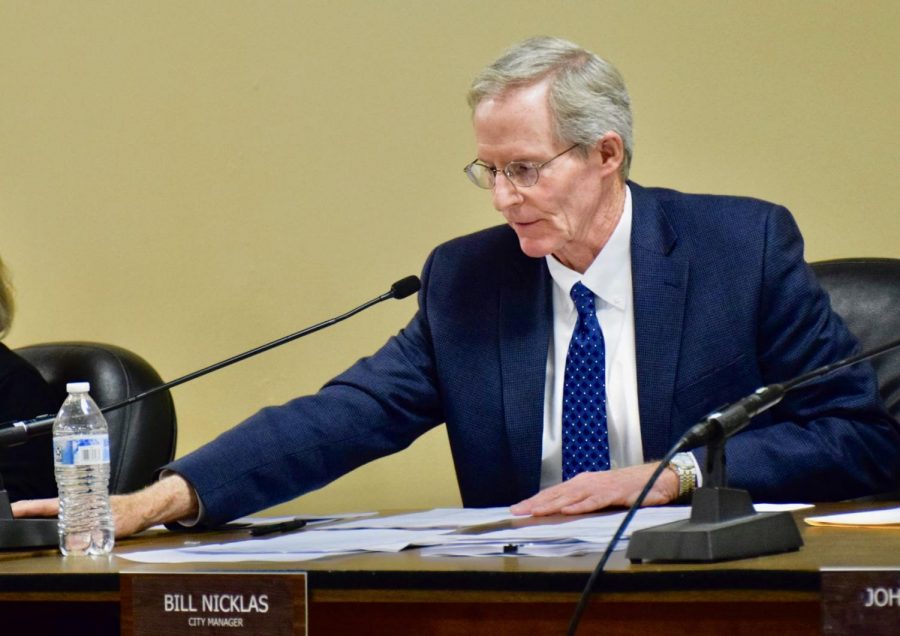City drafts FY2020 budget
Dekalb City Manager Bill Nicklas signed a nondisclosure agreement with Project Barb developers in June.
October 30, 2019
DeKALB — DeKalb property owners could see a decrease in their property tax bill.
At the Committee of the Whole meeting Tuesday, City Council members came to a consensus on a consideration that the best levy option was a 4% decrease from the 2019 tax levy.
City Manager Bill Nicklas said he doesn’t know what this would mean for the average homeowner or property owner because everyone’s property is unique.
“[The Finance Advisory Committee] is guessing that even with 2% inflation, if that actually gets baked into the supervisor of assessments evaluation for our community, we should see a slightly smaller rate for our taxpayers and in terms of the city tax rate,” Nicklas said.
Council members also agreed that increasing the local fuel tax was the best option in terms of capital funding.
Second Ward Alderperson Bill Finucane said he was comfortable with increasing the local fuel tax by 4 cents.
“We did this a couple of years ago, and we ended up doing a two-cent increase, and there was no noticeable difference between price and gas of DeKalb and Sycamore,” Finucane said. “With the largest single gas tax supplier here in town being the oasis, we do capture a lot of out-of-town dollars.”
The next City Council meeting is scheduled for 6 p.m. Nov. 12.
Budget draft
A draft of the DeKalb fiscal year 2020 budget focuses on savings in the General Fund and a need for more spending within capital and infrastructure projects within the city.
In February, four high-level employees were among the seven layoffs within the city that was supposed to save $1.1 million in savings within the General Fund but instead saved $580,000 in 2019, according to the Finance Advisory Committee Oct. 21 agenda.
The job of the committee is to analyze the city’s financial policies, long-term financial stability, options for greater efficiencies and possible revenue and expenditure modifications, according to the FAC City of DeKalb website.
The General Fund is a fund for all activity that hasn’t been assigned to a specific fund and is then put toward the General Fund. The city created a five-year plan financial plan, which started in 2018, which focuses on the “stabilization” of the General Fund, according to the agenda.
At the end of this year, the General Fund savings should amount to $8.9 million, an increase of $1.5 million more than last year’s $7.4 million, the increase is due to constrained department spending and other savings, according to the agenda.
The FY20 budget also includes capital and infrastructure spending. Typical examples of capital and infrastructure projects include railways and roads. A lot of capital and infrastructure needs have not been assessed in the city due to the lack of funding, according to the agenda.
“As of January 2019, approximately 25 miles of DeKalb roads needed immediate maintenance to prevent rapid degradation,” the agenda reads. “In 2019, a total of only 2.75 centerline miles received such maintenance. At this pace, the road mileage needing urgent maintenance is growing much faster than the funds available to maintain good or very good pavement ratings.”
The average street maintenance spending required to keep pace totals to $3.7 million per year, although the total budget for FY20 proposes $1.6 million.
For FY19, the motor fuel tax revenue was $1.1 million and due to the recent 19-cent increase in State motor fuel tax, the city will expect to generate an extra $500,000.
There are also three funding options on the drafted budget to help close the funding gap in road repairs and fleet replacements. Those options include a property tax increase, a home rule sales tax increase and a local fuel tax increase.
The FAC proposes an increase on the DeKalb property tax rate. Property taxes are used by multiple units of local government for revenue. The drafted budget proposes a targeted city tax rate of 1.2% and a city levy of $7 million. A levy is an official request from a local government for the funds it determines it requires from the property tax.
City Council members said they have a strong agreement for a steady or falling city tax rate, according to the agenda.
The current home rule and sales tax is 1.75% and the city proposes raising that percent to 2% which would produce about $963,411 in revenue that would be going exclusively to street improvements, according to the agenda.
{{tncms-inline content=”<ul> <li dir="ltr">The last funding option, a local fuel tax increase, proposes a 4% increase which would cut the gap for road repairs by 28%.&nbsp;</li> <li dir="ltr">For every two-cent increase, the local fuel tax produces an estimated $345,000 in revenue, according to the agenda.&nbsp;</li> <li dir="ltr">The current local fuel tax that is split between roads and airport expenses is at a rate of 5.5% per gallon.&nbsp;</li> </ul>” id=”06be9ef3-b01e-43f4-8d9c-20250390039b” style-type=”fact” title=”Just The Facts” type=”relcontent”}}
Editor’s note: This story was updated Oct. 30 to include details from Monday’s Committee of the Whole meeting.














